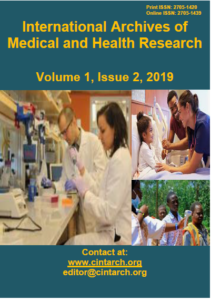
International Archives of Medical and Health Research (IAMHR), pISSN: 2705-1420; eISSN: 2705-1439
March to April 2019 Vol 1(2): pp.36-42 DOI: https://doi.org/10.33515/iamhr/2019.010/10
Copyright © 2019 C-International Archives
Original Article
Effect of maternal body mass index on gestational weight gain, pregnancy and perinatal outcomes
Mohammad B. Isah*, Constance E. Shehu, Mairo Hassan, Swati Singh, Abubakar A. Panti, Jamila A. Garba
Department of Obstetrics and Gynecology, Usmanu Danfodiyo University Teaching Hospital, Sokoto, Nigeria
*Corresponding Author’s Email: drisahbasir@gmail.com
Published April 30, 2019
ABSTRACT
Background: In recent years, the prevalence of obesity has risen among pregnant women worldwide with a concomitant increase in the risk of maternal and fetal complications. Aim: This study aimed to determine the effect of maternal body mass index on gestational weight gain, pregnancy and perinatal outcomes. Materials and Methods: A prospective study was conducted among 281 pregnant women presenting consecutively at the Antenatal Clinic of Usmanu Danfodiyo University Teaching Hospital, Sokoto, Nigeria. Anthropometric measurement was done for the participants at booking (in addition to questionnaire administration); their weight was subsequently monitored periodically until two-weeks postpartum, while fetal assessment was done at delivery. Data were analyzed using IBM SPSS version 20 statistical computer software package. Results: Of the 263 participants that completed the study, 2.7, 32.2 and 28.5% were underweight, overweight and obese respectively at booking. The weight gain in pregnancy ranged from 5.0 to 19.0kg (mean = 9.86 ± 2.84kg). The mean weight gain increased progressively from 2.74 ± 1.81kg in the first trimester to 3.79 ± 1.62kg in the third trimester. Antepartum hemorrhage, preterm labour, prematurity and fresh stillbirth were more prevalent among underweight participants, while instrumental delivery, caesarean section, low birth weight babies and babies with congenital anomaly were more prevalent among overweight and obese participants. Conclusion: Abnormal BMI conditions with adverse maternal and fetal outcomes were very prevalent among the participants in this study. Antenatal care providers should consistently educate their clients on the importance of adequate nutrition and optimal weight gain in pregnancy
Keywords: Maternal body mass index, gestational weight gain, pregnancy and perinatal outcomes

